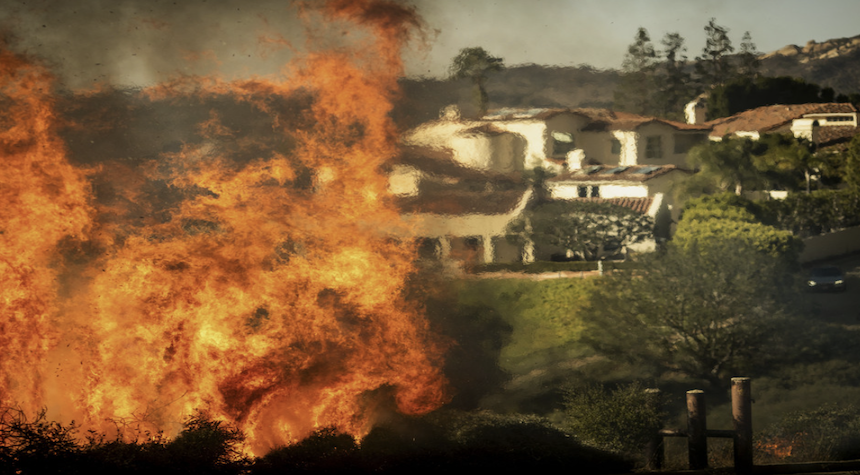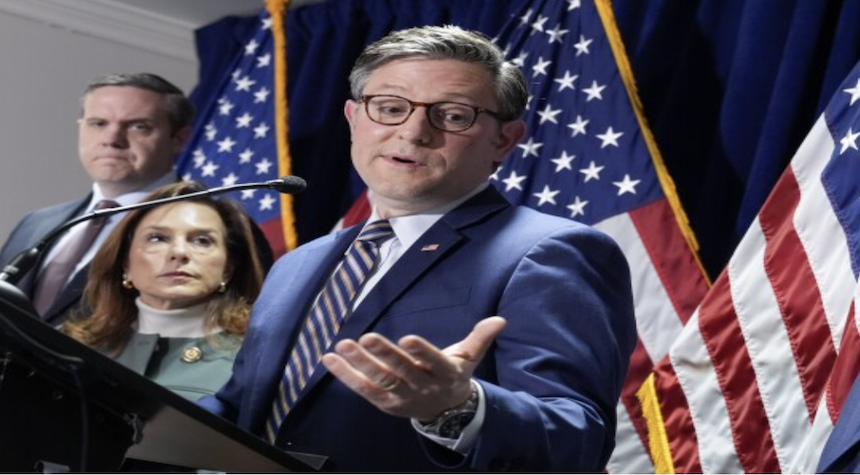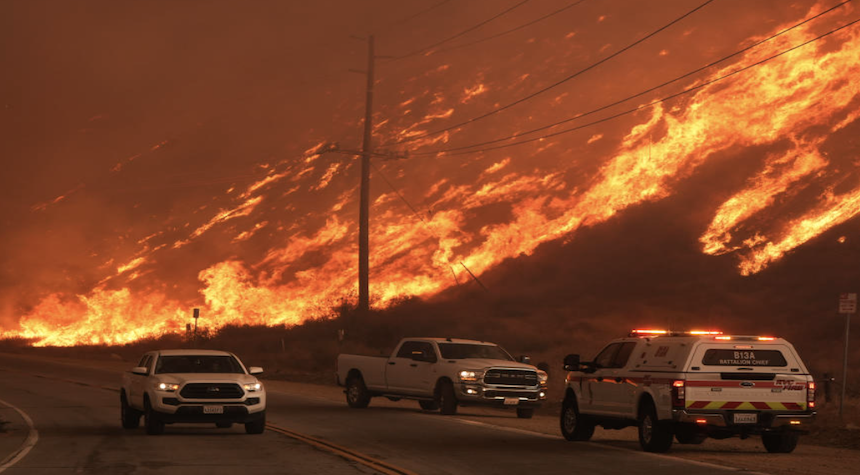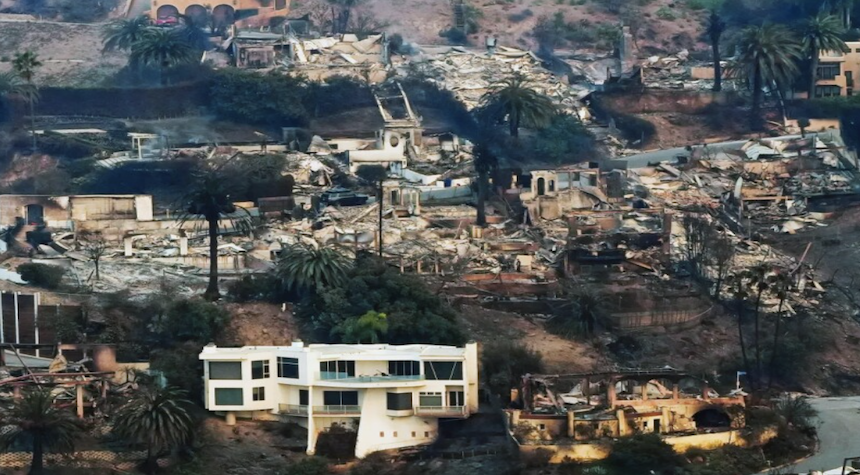California Republicans have reacted to suggestions made by President Donald Trump and House Speaker Mike Johnson that federal disaster assistance for the victims of the wildfires in Southern California is tied down. This could jeopardize the president’s agenda at the start of his second term when Congress is deeply divided.
Trump is planning to visit California this week to assess the damage caused by the recent fires. However, if a few House Members resist his attempts to condition disaster aid, it could complicate the already strained relationship between California’s liberal government and the second Trump Administration.
Many Republicans who won California House seats by a narrow margin in November expressed their dismay at the possibility that state aid could be tied to demands as an exchange for helping thousands of Californians still suffering from the disaster this month.
In a press release, Republican Rep. Young Kim said that playing politics with people’s lives is unacceptable. It is also a slap on the face for the Southern California wildfire survivors and our brave first responders. Her district, which is closely divided, is located in Orange County, a fire-prone area southeast of Los Angeles.
In an interview that aired on Wednesday night, Trump stated he could withhold California’s aid until it changes the way it manages its limited water resources. He claimed falsely that California’s efforts to conserve fish in the northern portion of the state were responsible for urban fire hydrants drying up.
Fox News’ Sean Hannity: “I don’t believe we should give California anything before they let the water drain down.”
Local officials said that the efforts to conserve the delta smelt did not have anything to do with hydrants drying up as firefighters attempted to control blazes in Los Angeles. The local officials blamed the high demand on a municipal firefighting system that was not designed for such fires.

The firestorms caused by the wind wiped out entire neighborhoods in Los Angeles County. They left thousands homeless, and more than twenty people were killed.
Trump stated earlier this week in his White House address that there are discussions underway to provide more water for the perennially parched Los Angeles. He was referring to runoff from rainfall which is lost to the Pacific, and the vast system of water storage and delivery within the state.
“Los Angeles has a massive amount of water at its disposal. All they have to turn is the valve,” the president said.
California has been a target for Trump since his inauguration, and he also mentioned the fires during that speech. He said that in LA, “We’re watching fires from weeks ago still burn tragically without any defense.”
This is going to change.
Trump has not mentioned the multinational firefighting forces deployed to deal with multiple fires. The two major fires were being fought by firefighters when, on Wednesday, a third fire broke out and burned hundreds of acres north of Los Angeles.
Johnson, a Louisiana Republican who echoes Trump’s complaints about the state, said that there are “serious problems” in the way it is managed. These include inadequate funding for water storage and forestry programs. He also mentioned the public disagreement between the LA Fire Chief and City Hall about budget cuts.
Johnson told reporters on Wednesday that the Democrat Governor. Gavin Newsom, Los Angeles Mayor Karen Bass and the State of California were not prepared for the future. He cited in particular a reservoir of 117 million gallons that had been left unfilled for almost a year. Newsom called for an independent review of the reservoir.

Bass did not directly answer a question regarding possible conditions for disaster aid. He said in a press release: “Our work will be based upon direct conversations with federal partners about how we can collaborate.”
Some Republicans have suggested the relief package for Congress could be entangled with attempts to raise the country’s debt ceiling. With the House so tightly divided, even one or two breakaway votes could change the outcome.
The GOP legislators from California are now in a difficult political position: they must decide whether to stand up for California, which is often vilified by the GOP for being the embodiment of all that’s wrong with America. Meanwhile, Republicans in Congress want to present a united front and turn their election victories in November into what Trump called a “golden age” in the United States.
Californian representatives agree that the federal government should guard against misuse of funds, but argue that money shouldn’t be held back or burdened with restrictions that are not imposed on other states following tornadoes and Hurricanes.
The dilemma was played out by Republican Rep. Ken Calvert in posts on social media. Calvert narrowly won his swing district, east of Los Angeles, in November.
He wrote that Californians have the right to receive federal assistance for disasters in the same way as Americans. He quickly added that “some federal policy changes might be necessary to accelerate rebuilding and improve wildfire prevention in the future.” These policies are not conditions.
Kevin Kiley, Republican Rep., whose district extends from east of Sacramento to Death Valley in the south, said last week on KCRA-TV that Johnson’s usage of the term conditions was “not particularly helpful.” He also stated at the Capitol, there is much ambiguity regarding what constitutes disaster aid conditions.
He wants to ensure that the money is not wasted by government inefficiency.
Kiley stated, “We want to ensure that the money gets to the victims so they can rebuild their homes and recover.”
Washington politicians have been fighting for years about how to curb the wildfire threat in the West. Republicans have complained for years that insufficient land management practices have increased the damage caused by wildfires. Democrats, on the other hand, have highlighted the role of climate change and the federal government’s failure to combat it.
The only thing that they all agree on is the fact that the problem continues.

Some lawmakers have pointed out that disaster assistance for Johnson’s native state of Louisiana over the years did not come with any conditions. Hakeem Jeffreys, the Democratic leader in Congress, called this idea a non-starter.
Republican Rep. Doug LaMalfa said that he was not concerned by the talk about conditions. His district is largely rural and extends from the Sacramento region north to the Oregon Border.
LaMalfa stated, “Everything has conditions. Especially the way California spends money.” “We want people to be helped and we want to assist with that just like we have assisted with others. California is irresponsible.”
Trump will visit the state on Friday to witness the damage. Newsom has not publicly stated if he will accompany Trump on his tour.
Johnson can’t afford to deviate from any vote, given the fragile GOP House majority (219 Republicans, 219 Democrats, and 1 vacancy). It could take several weeks for a more detailed accounting of the state’s recovery to be ready and for a formal request to be submitted to the White House.
After major natural disasters, the president usually makes additional spending requests. This was true after Hurricanes Helene and Milton.
Congress could also provide California with more disaster assistance through legislation. Sen. Lindsey Graham (R-SC), the Republican Chairman of the Senate Budget Committee said that he would include disaster assistance in a bill Republicans hope will be drafted this year to pay for Trump’s policy priorities.
Newsom asked Johnson and other leaders of Congress to approve aid for California, where the fires continue to burn and strong winds threaten to start new ones. In an email sent to supporters by his campaign committee, he warned that “Republicans” were holding federal aid hostage and that Democrats could get a few GOP votes to pass an aid package.
The governor wrote: “In times when natural disasters strike — from Hurricane Katrina through Hurricane Helene — Americans always stand together, putting aside politics to lend a hand to those who are in need.” “Historically, federal aid for disasters has been given without conditions.”

